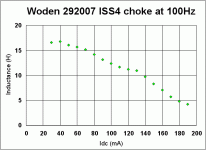Hi,
Wire size is the only true way to tell, unless you have a brand/model number someone might have data for.
Some manufacturers wind "hot", some "cold". New Hammond chokes for example are wound a lot hotter (higher DCR for current rating) than their old ones.
Do you have a list of brands or numbers? Throwing them out here is a good idea.
Cheers!
Wire size is the only true way to tell, unless you have a brand/model number someone might have data for.
Some manufacturers wind "hot", some "cold". New Hammond chokes for example are wound a lot hotter (higher DCR for current rating) than their old ones.
Do you have a list of brands or numbers? Throwing them out here is a good idea.
Cheers!
When I had that problem I used a variable CCS to pass current through the chokes whilst simultaneously measuring their inductance. When the inductance fell even more (it always falls with current), I figured I'd found the current rating. Surprisingly, some quite small chokes turned out to be quite good.
Geek: These chokes are second hand from scrapped tvs or hifi units. I suppose the tube compliment of the hifi could be an indication. Like a quad of 6V6 outputs.
EC8010: Sounds like a good plan. How were you measuring inductance under load? Using AC with a scope? Keeping an eye on the temp would be another low tech way.
EC8010: Sounds like a good plan. How were you measuring inductance under load? Using AC with a scope? Keeping an eye on the temp would be another low tech way.
astouffer said:GHow were you measuring inductance under load? Using AC with a scope?
No, my Marconi TF2700 bridge allows me to apply external DC whilst measuring inductance.
Attachments
SY said:Would it be useful to wave a probe around while increasing current and see the current at which the choke starts spraying field?
Very probably. It would need to be a search coil probing the magnetic field rather than an oscilloscope probe probing the electrostatic field.
EC8010 said:When I had that problem I used a variable CCS to pass current through the chokes whilst simultaneously measuring their inductance. When the inductance fell even more (it always falls with current), I figured I'd found the current rating. Surprisingly, some quite small chokes turned out to be quite good.
D'OH! Of course!
That's how I test new choke designs.
Here's a DIY circuit that can help:
http://www.angelfire.com/electronic/funwithtubes/Filter_Choke_Analyzer.html
I used similar only with a CCS as EC suggests. Make it a real HV transistor for the CCS though, well above the DC + peak, lest you have a room full of smoke

Cheers!
- Status
- This old topic is closed. If you want to reopen this topic, contact a moderator using the "Report Post" button.
- Home
- Amplifiers
- Tubes / Valves
- way to estimate choke current rating?
